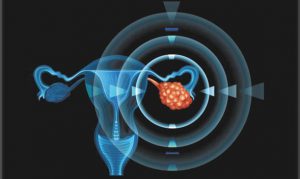By Jennifer Fernandez, APRN
 Ovarian Cancer is one of the deadliest cancers that women can face. Each year, nearly 22,000 women will be diagnosed with ovarian cancer in America. It is estimated by the World Health Organization IARC department that there are over 238,000 new cases diagnosed annually and nearly 152,000 deaths worldwide.
Ovarian Cancer is one of the deadliest cancers that women can face. Each year, nearly 22,000 women will be diagnosed with ovarian cancer in America. It is estimated by the World Health Organization IARC department that there are over 238,000 new cases diagnosed annually and nearly 152,000 deaths worldwide.
This cancer typically occurs in women in their fifties and sixties with the median age being 63. Many women who are diagnosed with Ovarian cancer have a genetic history that may include carrying the BRCA mutation gene and having a strong family history of ovarian cancer.
Symptoms
Unfortunately, many women don’t seek help until the disease has begun to spread. However, if detected at its earliest stage, the five-year survival rate is more than 93%. The symptoms of ovarian cancer are often subtle and easily confused with other ailments.
Symptoms may include:
• Abdominal bloating or swelling
• Quickly feeling full when eating
• Weight loss/weight gain
• Discomfort in the pelvic area
• Fatigue
• Back pain
• Changes in bowel habits, such as constipation
• A frequent need to urinate
• Shortness of breath
Diagnosis
Your doctor may order the following tests:
• Physical examination – Your doctor will palpate your abdomen to look for discomfort and tenderness or abnormal fluid.
• Pelvic examination – Yearly visits to the gynecologist are crucial.
• Blood Test – Your doctor may order a CA-125 blood test. This test measures CA-125 in the blood. CA-125 is found on the surface on ovarian cancer cells and also normal tissue. A high CA-125 level may indicate ovarian cancer or other conditions.
• Ultrasound
• Biopsy
Stages of Ovarian Cancer
There are four stages of ovarian cancer. Your doctor will determine the stage you are in upon diagnosis. Ovarian cancer is treated differently depending on which stage you are diagnosed with.
The four primary stages are:
Stage I: The cancer is completely contained within the ovary or ovaries.
Stage II: The cancer is in one or both of the ovaries and has spread to additional organs located in the pelvis such as the bladder, colon, rectum or uterus.
Stage III: The cancer is in one or both ovaries and has spread to the lining of the abdomen and/or the lymph nodes.
Stage IV: The most advanced stage of cancer. The cancer has spread from one or both ovaries to additional organs such as the liver or lungs, or there may be cancer cells in the fluid surrounding the lungs.
Ovarian Cancer Risk Factors
Ovarian cancer does not discriminate. It can strike a woman of any race or at any age. We do know that women with certain risk factors may have a greater chance of developing ovarian cancer.
These risk factors include:
• Family history of breast or ovarian cancer
• Personal history of cancer
• Women over the age of 55
• Women who have never been pregnant
• Women on menopausal hormone replacement therapy
Studies have found that women who have a mother, daughter, or sister with ovarian cancer have an increased risk of developing this disease. Women with a family history of breast cancer, uterine cancer, colon cancer or rectal cancer many also have an increased risk.
Women with the BRCA 1 or BRCA 2 gene have an increased risk of developing ovarian cancer.
Like all cancers, the ripple effects of ovarian cancer extend beyond the people who receive the diagnosis. It affects family, friends, colleagues, and neighbors. By coming together, we can raise awareness, research funding, and provide support for people living with ovarian cancer and their loved ones. That’s why it’s so important to get involved in Ovarian Cancer Awareness Month. Pin on a teal ribbon, learn about local organizations in your area, and get ready to take action.
Jennifer Fernandez, APRN
Jennifer is an Advanced Practice Registered Nurse who relocated to Florida from Illinois after obtaining her Master’s degree in nursing.
Jennifer obtained her Bachelor’s of nursing from Rivier University and her Master’s degree from Herzing University. While obtaining her Masters degree she completed a clinical rotation internship with Dr. Devine. This is where her interest in Women’s Health began. After graduating from her Masters degree program with a degree in Advanced Practice Registered Nursing she then began working in Urology. This eventually brought on the opportunity to work with Dr. Devine once again.
Jennifer joined the Center for Urogynecology and Female Pelvic Health in June 2022. She brings nearly 20 years of experience in the medical field to the practice ranging from Urology to outpatient surgery. Jennifer is offering her patients a personalized non-invasive approach to their common urologic and pelvic floor disorders with an emphasis on counseling/education, pelvic floor therapy, pessaries, hormone balancing, and other treatment modalities, as well as general gynecology.
The Center for Urogynecology and Female Pelvic Health in Venice, Florida, provides comprehensive and personalized care in a relaxed, spa-like office. Under the care of John Devine, MD, a fellowship-trained urogynecologist, the practice specializes in women’s pelvic health and urogynecology, providing care for women of all ages, from adolescents to adults.
For patient-centric care from an experienced physician with friendly and accommodating staff, call The Center for Urogynecology and Female Pelvic Health, or request an appointment today. Please call 941-457-7700.
Source: ovariancancerawareness.org









